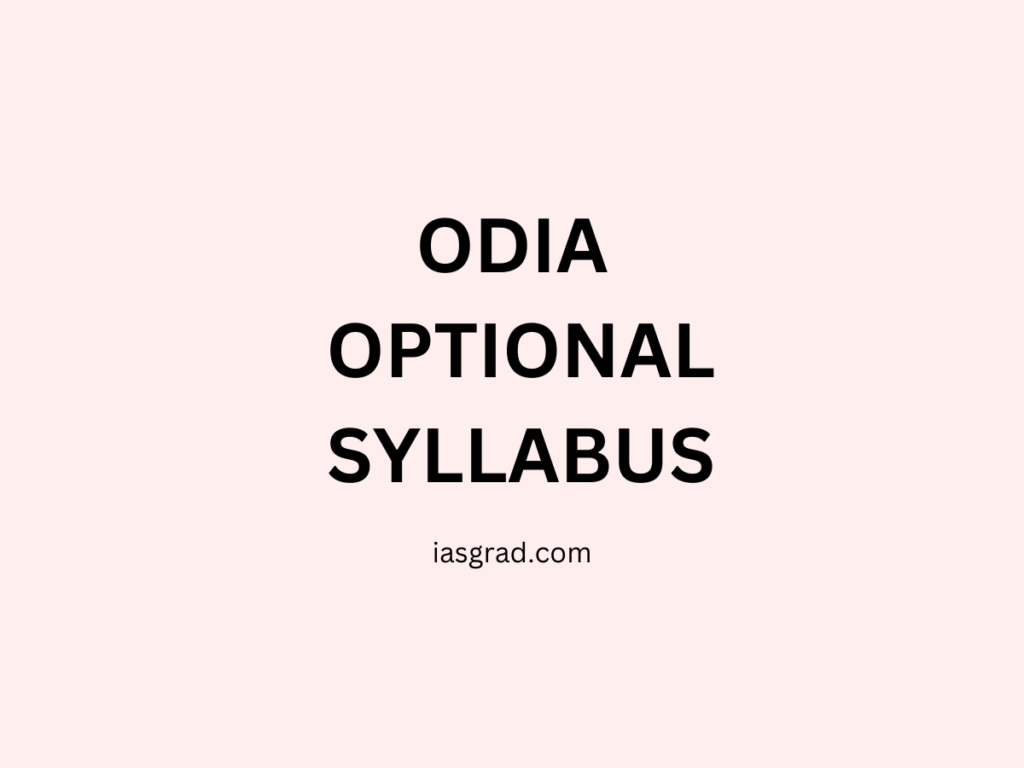Odia Optional Syllabus
The Odia Optional for the UPSC Civil Services Exam is a valuable choice for candidates with a strong background in the Odia language and its literature. The syllabus covers the historical development of Odia as a language, its grammar, and a detailed study of classical and modern literary works, including poetry, prose, and drama. This option allows candidates to explore the rich cultural and literary heritage of Odisha. This post provides a detailed breakdown of the syllabus.
Paper I: Odia Optional Syllabus
-
Section A:
- Origin and development of Odia Language—Influence of Austric, Dravidian, Perso— Arabic and English on Odia Language.
- Phonetics and Phonemics : Vowels, Consonants Principles of changes in Odia sounds.
- Morphology : Morphemes (free, bound compound and complex), derivational and inflectional affixes, case inflection, conjugation of verb.
- Syntax : Kinds of sentences and their trans-formation, structure of sentences.
- Semantics—Different types of change in meaning. Euphemism.
- Common errors in spellings, grammatical uses and construction of sentences.
- Regional variations in Odia Language (Western, Southern and Northern Odia) and Dialects (Bhatri and Desia).
-
Section B:
- Historical backgrounds (social, cultural and political) of Odia Literature of different periods.
- Ancient epics, ornate kavyas and padavalis.
- Typical structural forms of Odia Literature (Koili, Chautisa, Poi, Chaupadi, Champu).
- Modern trends in poetry, drama short story, novel essay and literary criticism.
Paper II: Odia Optional Syllabus
-
Section A:
-
Ancient:
- Sarala Das—Shanti Parva from Mahabharata.
- Jaganath Das—Bhagabata, XI Skadha—Jadu Avadhuta Sambada.
-
Medieval:
- Dinakrushna Das—Raskallola—(Chhandas—16 & 34)
- Upendra Bhanja—Lavanyabati (Chhandas—1 & 2)
-
Modern
- Radhanath Ray—Chandrabhaga.
- Mayadhar Manasinha—Jeevan—Chita.
- Satchidananda Routray—Kabita—1962.
- Ramakanta Ratha—Saptama Ritu.
-
-
Section B:
-
Drama:
- Manoranjan Das—Katha-Ghoda.
- Bijay Mishra—Tata Niranjana.
-
Novel:
- Fakir Mohan Senapati—Chhamana Athaguntha.
- Gopinath Mohanty—Danapani.
-
Short Story:
- Surendra Mohanty—Maralara Mrityu.
- Manoj Das—Laxmira Abhisara.
-
Essay:
- Chittaranjan Das—Tranga O Tadit (First Five essays).
- Chandra Sekhar Rath — Mun Satyadharma Kahuchhi (First five essays).
-
